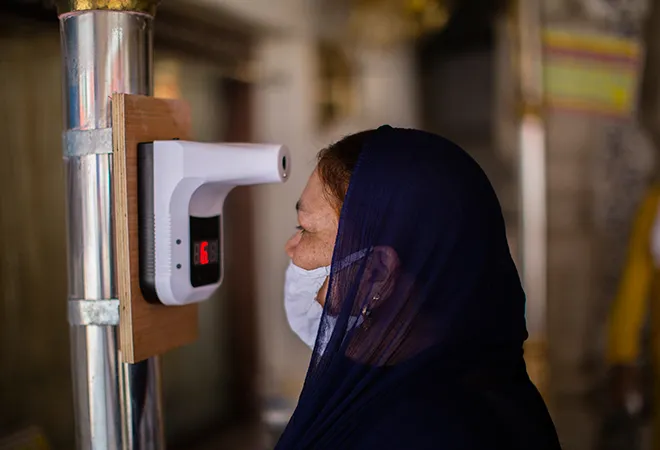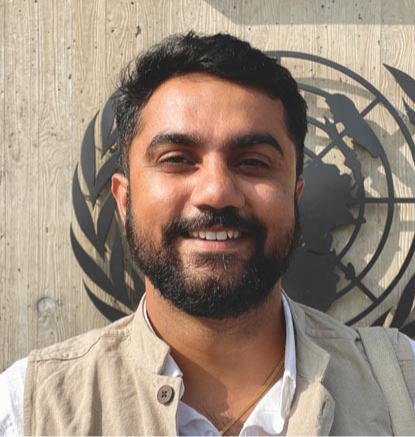
The pandemic has exposed the deep vulnerabilities of India’s healthcare system. Much of this is blamed on India’s low expenditure on public health –1.29% of the GDP (in 2019-20), lower than most other countries. Another critical reason for the weak public health in India is the absence of a statutory framework that guarantees a fundamental right to health There is a need to make the right to health a fundamental right – and implement it within the framework of legal devices and human rights principles of solidarity, proportionality, and transparency which will help India address the challenges posed by COVID19. Implementing the right to health within India's framework of co-operative federalism will build capacities where they are most needed – at the grassroots.
Constitution and the Right to Health
The Constitution of India does not expressly guarantee a fundamental right to health. However, there are multiple references in the Constitution to public health and on the role of the State in the provision of healthcare to citizens.
The Directive Principles of State Policy in Part IV of the India Constitution provide a basis for the right to health. Article 39 (E) directs the State to secure health of workers, Article 42 directs the State to just and humane conditions of work and maternity relief, Article 47 casts a duty on the State to raise the nutrition levels and standard of living of people and to improve public health. Moreover, the Constitution does not only oblige the State to enhance public health, it also endows the Panchayats and Municipalities to strengthen public health under Article 243G (read with 11th Schedule, Entry 23).
Given no explicit recognition of the right to health or healthcare under the Constitution, the Supreme Court of India in Bandhua Mukti Morcha v Union of India & Ors interpreted the right to health under Article 21 which guarantees the right to life. In State of Punjab & Ors v Mohinder Singh Chawla the apex court reaffirmed that the right to health is fundamental to the right to life and should be put on record that the government had a constitutional obligation to provide health services. In State of Punjab & Ors v Ram Lubhaya Bagga, the court went on to endorse the State’s responsibility to maintain health services.
In September 2019, a High-Level Group on the health sector constituted under the 15th Finance Commission had recommended that the right to health be declared a fundamental right. It also put forward a recommendation to shift the subject of health from the State List to the Concurrent List. The recommendation to declare the right to health a fundamental right, if implemented, will strengthen people’s access. However, the latter recommendation to shift health to the Concurrent List will lead to a constitutional conundrum on whether the centralisation of public health will be helpful in the context of Indian cooperative federalism. At present, the subject of “public health and sanitation; hospitals and dispensaries” falls under the State List of the 7th Schedule of the Constitution of India - which means that state governments enjoy constitutional directives to adopt, enact and enforce public health regulations.
The recommendation to declare the right to health a fundamental right, if implemented, will strengthen people’s access. However, the latter recommendation to shift health to the Concurrent List will lead to a constitutional conundrum on whether the centralisation of public health will be helpful in the context of Indian cooperative federalism
A 2019 NITI Aayog report highlighted that states in India had unequal public health systems. This imbalance was primarily due to restricted technical expertise and fiscal constraints. While fiscal dependence of states on the centre continues to be a major challenge, if the subject of health was moved to the Concurrent List, it would lead to excessive bureaucracy, red tape and institutional constraints. Even as the policy decision of states would continue to remain subjective to the political orientation of the federal executive, this centralisation would rip states of their constitutional rights. Furthermore, a uniform strategy would not provide the specialised attention that states across India need.
On a crucial subject like health, there must be coordination between the centre and states without impeding cooperative federalism - an essential element of the Indian Constitution. The joint response to COVID19 has demonstrated the need for strong capacities at the district and local levels to contain the spread of the pandemic. Lessons from the response also show that while smooth coordination between states and the centre is imperative, health needs to continue to be in the State List. Decentralisation of power and funds to states for boosting their respective public health systems is therefore imperative. For example, Uttar Pradesh and Bihar, though they struggled in the beginning, were able to control the Japanese Encephalitis outbreak in 2019. Even in the ongoing pandemic, Maharashtra and Delhi invoked The Epidemic Diseases Act, 1897 before the central government invoked the National Disaster Management Act, 2005 on March 23.
Through the Directive Principles of State Policy, the Constitution has made a forceful appeal to the State to provide a decent standard of living. Several legal precedents have dictated that the state is responsible for citizens’ healthcare. India’s commitment to international legal treaties and conventions also binds it, as a state party, to enhance and provide adequate public services and a minimum standard of universal health care. Existing constitutional guarantees, legal precedents and global commitments form a solid basis for a fundamental right to health in India. A legislatively guaranteed right will make access to health legally binding and ensure accountability. A constitutional amendment on the lines of the 93rd Amendment to the Constitution which provided a constitutional sanction to the right to education, should be adopted for providing adequate healthcare in India.
Principles to be adopted
In addition to statutory recognition, the right to health in India will need to be implemented within the framework of principles of solidarity, proportionality, and transparency that are central to international human rights and health law, as proposed by Professor of Health Law Katharina Ó Cathoir. These three principles are even more crucial in addressing the present challenge posed by the COVID19.
In addition to statutory recognition, the right to health in India will need to be implemented within the framework of principles of solidarity, proportionality, and transparency that are central to international human rights and health law
The principle of solidarity is closely linked to the fundamentals of justice and equity. In the context of the right to health, solidarity can guarantee equal access to public health systems to all. In the current pandemic, India’s marginalised communities are disproportionately hurt due to the lack or minimal access to healthcare and other basic needs which have further deepened stark inequalities. The assertion of solidarity requires that the government and institutions treat people and protect their rights equally without any discrimination based on sex, caste, class, religion and language. At the national level, domestic solidarity would mandate state governments and institutions to look for standard solutions to shared challenges for combined interests.
In the legal context, the doctrine of proportionality is a tool to determine a correct balance between the restrictions imposed by the state as a corrective measure and the severity of the prohibited acts. The doctrine of proportionality help in determining the conditions for a limitation of constitutionally-protected rights. In the present time, the Government of India along the other countries has adopted far-reaching measures such as lockdown to control movement, mandatory institutional quarantine and criminalisation of those who do not comply with the guidelines. These actions have resulted in unprecedented restrictions on civil liberties and human rights. The government is certainly entitled to take certain decisions for the betterment of public health; however, these decisions should not be dehors the test of proportionality. Tough and hard decisions don’t necessarily lead to success; it is the systematic approach and respect for human rights along with the interest of the community at larger that is the way forward. For example, Japan, South Korea and Sweden, while respecting the civil rights of their citizens, took less restrictive measures to address the challenge posed by COVID19 and are successful.
The principle of transparency is critical for good governance and to ensure people’s trust in public administration. To effectively allow the scrutiny of decisions made by the government and of its maintained institutions, information should be available, accessible and disseminated among the population. The principle of transparency goes hand-in-hand with that of accountability and reliability. In the context of the right to health and healthcare, the practice of transparency will help in keeping the inflation in drugs and medical services under control, maintain the adequate functioning of public institutions and hold on to the trust of the people. Recent efforts to use big data analytics to track patients and trace contacts through applications like Aarogya Setu, need to align with the principle of personal data protection, and any use or dissemination should be with the prior consent of the citizens in a transparent manner. There have been multiple reports of data fudging of COVID19 cases in India, affecting people's trust.
Parting note
It is time India declared the right to health a fundamental right. Strong health laws will help build societal resilience to future pandemics and public health emergencies. Emergency responses can’t come at the cost of neglect of human rights obligations. It is critical then that the right to health be implemented, using the principles of transparency, proportionality and solidarity. The COVID19 experience has also demonstrated the importance of a decentralized/polycentric response - India's co-operative federalism, therefore, must be strengthened.
The views expressed above belong to the author(s). ORF research and analyses now available on Telegram! Click here to access our curated content — blogs, longforms and interviews.




 PREV
PREV


